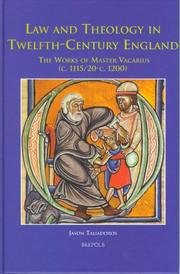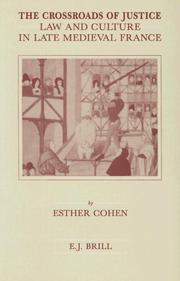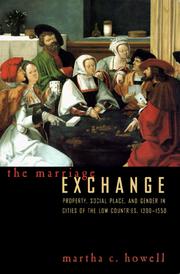| Listing 1 - 4 of 4 |
Sort by
|

ISBN: 9782503517827 250351782X Year: 2006 Volume: v. 10. Publisher: Turnhout: Brepols,
Abstract | Keywords | Export | Availability | Bookmark
 Loading...
Loading...Choose an application
- Reference Manager
- EndNote
- RefWorks (Direct export to RefWorks)
Droit médiéval --- Law [Medieval ] --- Medieval law --- Middeleeuws recht --- Recht [Middeleeuws ] --- Theology --- Law, Medieval. --- Religion and law --- Théologie --- Religion et droit --- History --- Methodology. --- Histoire --- Méthodologie --- Vacarius, --- Recht --- Theologie. --- Recht. --- Théologie --- Droit médiéval --- Méthodologie --- Middle Ages, 600-1500 --- Methodology --- To 1500 --- Vacarius --- Middle Ages, 500-1500 --- Theology - History - Middle Ages, 600-1500. --- Theology - Methodology. --- Religion and law - History - To 1500.

ISSN: 09208607 ISBN: 9004095691 9004246851 9789004095694 Year: 1993 Volume: 36 Publisher: Leiden Brill
Abstract | Keywords | Export | Availability | Bookmark
 Loading...
Loading...Choose an application
- Reference Manager
- EndNote
- RefWorks (Direct export to RefWorks)
The book is an analysis of the cultural and social functions of law, legal processes and legal rituals in late medieval Northern France. It is centered around a time and a place in which European law underwent some major transformations, from a plethora of local oral customs to a fairly coherent system of national, written customary law. In this process, law and legal procedures came to reflect a great variety of cultural traditions, ranging from popular perceptions of animals and the human body to learned ideas of Roman jurisprudence. Drawing upon wide-ranging sources: judicial, legal, literary and historical, Cohen analyzes the various influences upon the shaping of law as a cultural manifestation and its application as an actual system of justice.
History of the law --- History of civilization --- anno 500-1499 --- France --- Droit médiéval --- Law [Medieval ] --- Medieval law --- Middeleeuws recht --- Recht [Middeleeuws ] --- Ritualism --- Ritualisme --- Customary law --- Culture and law --- Law, Medieval --- 34 <09> <44> --- -Law, Medieval --- Ritual --- Customs (Law) --- Folk law --- Usage and custom (Law) --- Social norms --- Common law --- Time immemorial (Law) --- Law and culture --- Law --- Rechtsgeschiedenis --(algemeen)--Frankrijk --- Culture and law. --- Law, Medieval. --- Ritualism. --- 34 <09> <44> Rechtsgeschiedenis --(algemeen)--Frankrijk --- History --- Droit coutumier --- Histoire --- Droit medieval --- Culture et droit
Book
ISBN: 2130455557 9782130455554 Year: 1993 Volume: *34 Publisher: Paris Presses universitaires de France
Abstract | Keywords | Export | Availability | Bookmark
 Loading...
Loading...Choose an application
- Reference Manager
- EndNote
- RefWorks (Direct export to RefWorks)
Legal theory and methods. Philosophy of law --- anno 1200-1799 --- Constitutional history --- Constitutional history [Medieval] --- Constitutional history [Modern ] --- Constitutional law--History --- Constitutionele geschiedenis --- Constitutionele geschiedenis van de middeleeuwen --- Constitutions--History --- Droit médiéval --- Geschiedenis [Constitutionele ] --- Histoire constitutionnelle --- Histoire constitutionnelle du moyen âge --- Law [Medieval ] --- Medieval law --- Middeleeuws recht --- Recht [Middeleeuws ] --- Constitutional history, Medieval --- Histoire constitutionnelle médiévale --- Europe --- Religion --- --Droit --- --Constitution --- --Philosophie --- --Histoire --- --Legal theory and methods. Philosophy of law --- Ecclesiastical law --- History --- Religion and law --- --Constitutional history, Medieval --- --Constitutional history --- Droit --- Constitution --- Philosophie --- Histoire

ISBN: 0226355160 0226355152 9780226355160 Year: 1998 Volume: *33 Publisher: Chicago, Ill. University of Chicago Press
Abstract | Keywords | Export | Availability | Bookmark
 Loading...
Loading...Choose an application
- Reference Manager
- EndNote
- RefWorks (Direct export to RefWorks)
Based on extensive research in this archive, this book reveals how these documents were produced in a centuries-long effort to regulate --and ultimately to redefine-- property and gender relations. At the center of the transformation was a shift from a marital property regime based on custom to one based on contract. In the former, a widow typically inherited her husband's property; in the latter, she shared it with or simply held it for his family or offspring. Howell asks why the law changed as it did and assesses the law's effects on both social and gender meanings but she insists that the reform did not originate in general dissatisfaction with custom or a desire to disempower widows. Instead, it was born in a complex economic, social and cultural history during which Douaisiens gradually came to think about both property and gender in new ways. Medieval Douai was one of the wealthiest cloth towns of Flanders, and it left an enormous archive documenting the personal financial affairs of its citizens --wills, marriage agreements, business contracts, and records of court disputes over property rights of all kinds.
History of the Low Countries --- anno 1400-1499 --- anno 1500-1599 --- anno 1300-1399 --- Droit médiéval --- Law [Medieval ] --- Medieval law --- Middeleeuws recht --- Recht [Middeleeuws ] --- Husband and wife --- Marital property --- Law, Medieval --- History --- History. --- Law, Medieval. --- #VCV monografie 1999 --- Droit médiéval --- anno 500-1499 --- France --- Matrimonial property --- Property, Marital --- Property --- Man and wife --- Matrimonial regime --- Spouses --- Wife and husband --- Domestic relations --- Women --- Desertion and non-support --- Marriage law --- Married women --- Law and legislation --- Legal status, laws, etc. --- Flanders (County) --- Douai (France) --- Marital property - Flanders - History --- Husband and wife - Flanders - History --- Marital property - France - Douai - History --- Husband and wife - France - Douai - History --- HUWELIJKSLEVEN -- 930.347 --- MIDDELEEUWEN -- 930.347 --- MODERNE TIJDEN -- 930.347 --- HUWELIJKSLEVEN -- 930.348 --- MIDDELEEUWEN -- 930.348 --- MODERNE TIJDEN -- 930.348 --- MODERNE TIJDEN -- 930.32 --- Marriage --- Matrimonial law --- Book --- Property rights --- Inheritance law
| Listing 1 - 4 of 4 |
Sort by
|

 Search
Search Feedback
Feedback About UniCat
About UniCat  Help
Help News
News